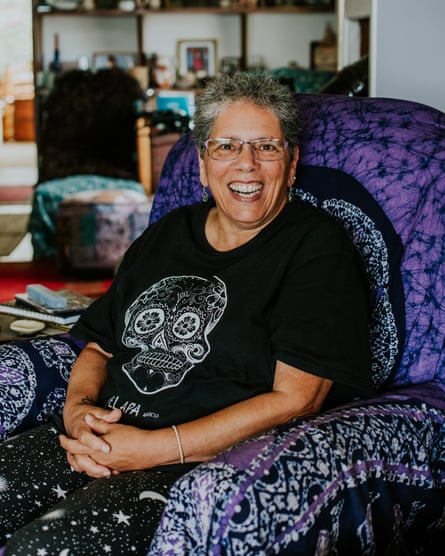‘I don’t want to suffer’: the case for assisted dying in Scotland
Ani, who has motor neurone disease, and Suzie, who watched her husband die in agony, share their reasons for wanting change
Majority of Scottish voters support assisted dying bill, poll reports
Severin Carrell Scotland editor
@severincarrell
Severin Carrell Scotland editor
@severincarrell
Sun 17 Sep 2023
Theresa George, known to most as Ani, says she has no fear of dying but does have a fear of how she dies. She has a degenerative, incurable condition, and when her defences are down, the upsurge of stress and anxiety can at times feel overwhelming.
“I can have panic attacks,” she said. “All of my effort at this point is on trying to keep a positive mental attitude and enjoying what life I have left.”

Theresa George, known to most as Ani, says she has no fear of dying but does have a fear of how she dies. She has a degenerative, incurable condition, and when her defences are down, the upsurge of stress and anxiety can at times feel overwhelming.
“I can have panic attacks,” she said. “All of my effort at this point is on trying to keep a positive mental attitude and enjoying what life I have left.”

Ani: ‘All of my effort at this point is on trying to keep a positive mental attitude.’ Photograph: Jennifer MacPhee-Campbell/Dignity in Dying
George, 63, has lived for 20 years on the west coast of North Uist in the Outer Hebrides with her partner, Maire Coniglio. Originally from Maine in New England, George had been working in home care when late last year she was diagnosed with motor neurone disease.
“When I came home and told my partner, she said ‘No, no, no, it can’t be that,’” George recalled.
The progressive disease began with loss of mobility in her left ankle and foot; it spread to affect her leg and now her left side is subject to tremors and weakness. A trained massage therapist, George now uses a motorised wheelchair.
Living with accelerating physical deterioration, she has the very real fear of “being trapped in my own body”, she said. “I’m slowly watching myself deteriorate, really, and it just brings up all that anxiety and fear and the stress of it all. I don’t have a fear of dying but I do have a fear of how I die – I think most people can relate to that.
“I don’t want to die but more so, I don’t want to suffer.”
George considered travelling to the Dignitas assisted dying clinic in Zurich. Faced with the significant costs of doing so – estimated by the pro-assisted dying campaign group Dignity in Dying at about £15,000 – and the logistics of travelling there, she quickly dropped the idea.
For her, dying at home on her own terms would be far preferable than the added stress of dying in an anonymous room abroad. “To have that at home, with people that you love around you, that would be amazing,” George said.

George, 63, has lived for 20 years on the west coast of North Uist in the Outer Hebrides with her partner, Maire Coniglio. Originally from Maine in New England, George had been working in home care when late last year she was diagnosed with motor neurone disease.
“When I came home and told my partner, she said ‘No, no, no, it can’t be that,’” George recalled.
The progressive disease began with loss of mobility in her left ankle and foot; it spread to affect her leg and now her left side is subject to tremors and weakness. A trained massage therapist, George now uses a motorised wheelchair.
Living with accelerating physical deterioration, she has the very real fear of “being trapped in my own body”, she said. “I’m slowly watching myself deteriorate, really, and it just brings up all that anxiety and fear and the stress of it all. I don’t have a fear of dying but I do have a fear of how I die – I think most people can relate to that.
“I don’t want to die but more so, I don’t want to suffer.”
George considered travelling to the Dignitas assisted dying clinic in Zurich. Faced with the significant costs of doing so – estimated by the pro-assisted dying campaign group Dignity in Dying at about £15,000 – and the logistics of travelling there, she quickly dropped the idea.
For her, dying at home on her own terms would be far preferable than the added stress of dying in an anonymous room abroad. “To have that at home, with people that you love around you, that would be amazing,” George said.

Suzie Mcallister, whose husband, Colin, died this year. Photograph: Murdo MacLeod/The Guardian
Suzie McAllister, 47, a primary school teacher in Fort William, empathises. She cared for her husband, Colin, a very fit and active climber and kayaker, as he died in enormous pain from an aggressive and untreatable stomach tumour earlier this year.

Suzie McAllister, 47, a primary school teacher in Fort William, empathises. She cared for her husband, Colin, a very fit and active climber and kayaker, as he died in enormous pain from an aggressive and untreatable stomach tumour earlier this year.

Colin considered Dignitas clinic. Photograph: Murdo MacLeod/The Guardian
The sedatives and pain relief he was given simply failed to alleviate his suffering and distress, she said. The cancer made it impossible for him to eat. He would wake up crying out in pain.
For McAllister, it is incomprehensible the law cannot allow someone in that degree of pain to voluntarily end their suffering. Colin considered Dignitas; towards the end, he pleaded for her to find the drugs to end his life on the internet.
“He had no control, no right to choose, and that’s what made him angry” she said. “You can’t tell me that the way Colin died was moral in any way. The autonomy, the will of the patient, has to be considered.
“It wasn’t tolerable, not for me having to watch it and certainly not for him.”
The sedatives and pain relief he was given simply failed to alleviate his suffering and distress, she said. The cancer made it impossible for him to eat. He would wake up crying out in pain.
For McAllister, it is incomprehensible the law cannot allow someone in that degree of pain to voluntarily end their suffering. Colin considered Dignitas; towards the end, he pleaded for her to find the drugs to end his life on the internet.
“He had no control, no right to choose, and that’s what made him angry” she said. “You can’t tell me that the way Colin died was moral in any way. The autonomy, the will of the patient, has to be considered.
“It wasn’t tolerable, not for me having to watch it and certainly not for him.”
No comments:
Post a Comment